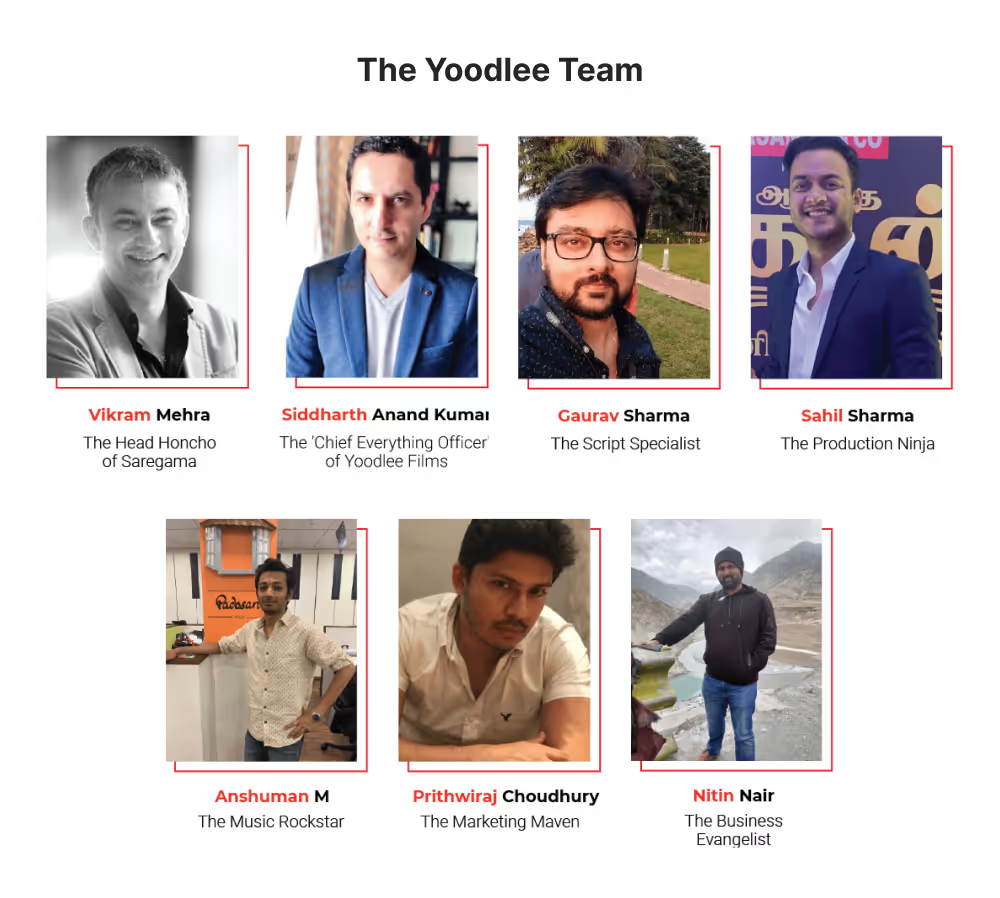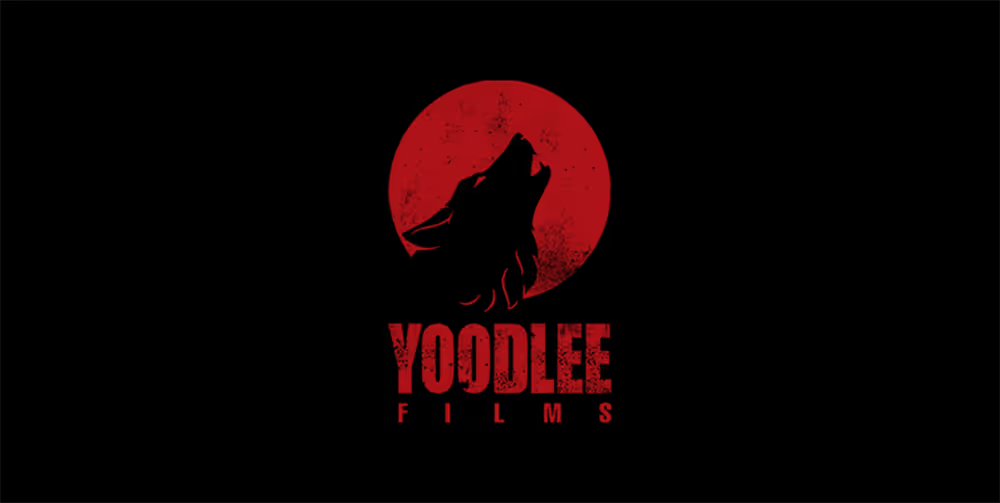
Yoodlee Films Logo
Yoodlee Films, owned by Saregama, India’s oldest music company, has been creating waves in the streaming platforms like Netflix and Hotstar with their offbeat films. The first release, Ajji, directed by Devashish Makhija, left the audience jolted with its raw depiction of a very sensitive topic like rape and was critically acclaimed. This was followed by the release of Brij Mohan Amar Rahe on Netflix in December 2018 and the next film Kuchh Bheege Alfaaz was directed by Onir, a National Award winning director. In merely three years since its inception, nine movies of Yoodlee Films have found a place on Netflix and two on Hotstar, with a third one slated for launch soon. Yoodlee Films has made 18 films so far, not only in Hindi but also in Malayalam, Tamil and Marathi.They are now aiming at bigger films targeting the box office
Yoodlee Films has a team of young filmmakers who are ready to explore new ideas and enter uncharted territories. That is why the production house is not hesitant to work with new directors and writers for their films. However, along with firmly controlled budget and timelines, Yoodlee Films is firm on its policy to retain intellectual property for all their launched films. The journey so far has been very interesting and the meticulous planning and strategy that the team follows can inspire other businesses to take a leaf from their book.
Background
Saregama’s initial tryst with film producing was faced with a few setbacks – consecutive flops like Jhoota Hi Sahi and Soundtrack, going overboard with the budget of My Japanese Wife and being a part of the panel that produced television content like Saabdhan India– a well-rated show yet not of very high creative standards. The company was perceived as a production house with low creative abilities.
The idea of Yoodlee Films rose from a zeal of
- proving its capability of producing good quality cinema,
- bringing back the lost glory of the company as a film producer,
- and most importantly, making profits in the process.
In an industry where going overboard on the budget while making films is almost an unwritten norm, and only a limited number of all films that see the light of the day actually go on to becoming hits and making money, the decision of getting into filmmaking obviously had to be a well-deliberated one.
In the usual process of filmmaking, a script is brought to the producers and after the initial discussions and script reading, if the script is approved, the producer decides to finance the project. The producer transfers the money to the director, who then generally takes care of the entire film, including getting the production controller, etc. till the film is completed. However in such a setup, more often than not, the film overshoots the budget and timelines.
Saregama was clear that it had to find its sweet spot and bring some sort of coherent process into this usual scheme of things. A lot of studio models were therefore studied. Saregama finally decided to form an entirely different entity called Yoodlee Films, to give it a fresh and distinct identity from the parent company. After a lot of deliberation, they decided to tread the unconventional route of creating films with evocative and realistic content that mirrors the realistic, and often, the darker recesses of the society. Its brand positioning would be creating story-led cinema where the story is the crowd-puller, rather than larger-than-life theatrical releases with an established star cast.
Existing Marketing Dynamics
Before closing in on the strategy, the initial deliberations of how the films would be planned and executed were determined based on the existing market dynamics
- Anticipation of the advent of streaming platforms like Hotstar and Netflix
- Poor market reputation due to the previous unsuccessful attempts at making films that raked profits at the box-office
- A perception that demand exists for realistic and thought-provoking content, and therefore have a development team in place to work on original ideas
- Based on previous experience, have a self-sufficient production studio that can progress into bigger projects with their processes growing to cope up with the size
- Produce content for films rather than TV series because it gives them rights over Intellectual Property (IP) and also the brand name can be prominently attached to the projects. [This is important as the television series becomes the stream-ing channel’s property and also the margins are pre-determined and thin.]
Takeaway: Before setting off on anything, it is critical to learn from the past mistakes and create systems which address every concern and vision. Some punts have to be taken – some work, some don’t, but that’s the nature of the beast called – business.
Getting complete control over processes
The first important step in the way forward was the decision of being meticulously involved in the entire filmmaking process. Already aware of the tricks of the trade, the Yoodlee Films team precisely knew the loopholes in the process that lead to delays and excesses. They decided that they should produce the films themselves and have the ultimate control and onus of the entire project. In other words, they would be a partner in the entire process of filmmaking and have a deeper relationship with each project, right from the script selection, casting, shooting, to post-production, release and marketing of the film. They also decided that the Intellectual Property (IP) Rights of whatever content they produce would ultimately reside with them.
Takeaway: For a successful project execution, understand the various loopholes that exist in the system and have a deeper involvement and complete control over the processes.
Building self-sufficient in-house capabilities
With the initial team members from the industry, Yoodlee Films decided to create a full-fledged team with people who have adequate knowledge of film-making themselves and are passionate about it. From the script-writers, to the director of photography (dop), even assistant directors and line producers, they put up an entire team of in-house talent who have hands-on experience in their disciplines and are capable of doing the job themselves. The equipment is outsourced. The art is done in-house. The team knows exactly what they want from each film, so there’s less guess work and greater creative control. For example, the dialogues of one of the very popular Yoodlee Films, Brij Mohan Amar Rahe, were written by Gaurav Sharma, who heads the scriptwriting team.
Takeaway: Have people on the team who have deep knowledge and hands-on experience about the job in hand, instead of depending solely on outsourced resources. Generalised knowledge can often backfire in the long run and is not an optimal solution in team-building.
Fun Facts From Yoodlee
Talha Arshad Reshi, the kid who was cast as Hamid and won National Award for the best child actor, was originally rejected by the director. It was just two days before the shoot that the selected kid backed out and the Yoodlee Films team decided to go ahead with him.
Playing the quantity game
Instead of producing one high budget film that may or may not work at the box office, Yoodlee Films decided to play the volume game by making a large number of films in a year. These are low budget films with an average expenditure of less than Rs 5 crores, covering different genres. The kinds of films made are purely determined by what the audience demands, and not out of any personal choice. This carpet-bombing is also a technique of hedging risks and ensuring that the returns are stable. Therefore since the inception in 2017, Yoodlee Films now has 18 licensed films in its kitty, nine of which have found a place on Netflix and two on Hotstar, with a third one slated for launch soon.
Takeaway: Observe the market dynamics, anticipate changes in advance, and be prepared with a solution.
Choosing the right platform
Alongside the decision of working on low budgets, was also the important decision of which platform would the content be created for. While the Indian theatres are teeming with larger-than-life films meant for family entertainment, there was a niche for realistic, edgy films that had artistic integrity and were accessible for a more personal viewing. Yoodlee Films anticipated that soon the Indian film and television landscape would be overtaken by OTT platforms, like Netflix, Amazon Prime, Hotstar and their ilk, and create a disruption in how entertainment is consumed. With entertainment available on mobile phones and smart TVs in one’s private space, people would open up to watching true-to-life, edgy and even dark and intimate content, which they would otherwise not watch with their families in the theatres. And this is bound to increase in the years to come given that the gateways of cheap high speed affordable data are opening up. When Yoodlee Films was starting off these streaming OTT platforms were beginning to make inroads to the Indian homes, and they were hungry for good content. The OTT space is expected to get even busier in the coming years and it will be taking a big chunk of the entertainment pie. The timing was crucial and Yoodlee Films was at the right juncture.
Takeaway: Have people on the team who have deep knowledge and hands-on experience about the job in hand, instead of depending solely on outsourced resources. Generalized knowledge can often backfire in the long run and is not an optimal solution in team-building.
Creating transparent processes
In an industry where ambiguity and chaos are the norms, the Yoodlee Team set out with a very professional and transparent approach, bringing in a method to the madness. For example, they have a standard operating procedure which defines the criteria on how to choose a movie and green-light a project. These include the theme of the film, the logline (the little description of the film that helps a viewer to decide if they want to watch the film), the uniqueness of the story, whether the story brings in something thought-provoking, and finally the overall entertainment factor.
A detailed database of all the scripts is maintained with details like who has written it, when did the response go, what feedback was given, a detailed synopsis of the story, the log-line – the message that will resonate later on and even the script reader’s opinion. This helps them to know and keep a track of sorts of stories which are doing the rounds. One of Yoodlee Film’s well acclaimed productions, Hamid, was dismissed initially because of the script. However, later they signed on the director, got a new writer to re-write the script, and the movie was made which went on to win several awards, including two national awards. Screenplay-writing workshops are held to help the script writers convert a story that lends itself to an interesting film. Yoodlee Film’s Brij Mohan Amar Rahe and Noblemen were made thus.
Takeaway: Create detailed Standardised Operating Processes to have control over the quality of work.
Fun Facts From Yoodlee
Naga Vishal, the kid from KD who won the best actor award in Jagran Film Festival, where the other nominees in the category were Ranveer Singh, Vicky Kaushal, and Ayushhman Khurrana, was actually at the auditions to accompany his brother. Upon interaction with him, the director felt he is a better fit for the role and decided to train him for a month to play the part.
Being Connected
To get realistic stories that are deeply rooted in the milieu, the Yoodlee team tied up with 12 to 15 crime reporters in tier 2 and 3 cities, who send stories that are otherwise not reported in the mainstream media. This helped them to keep their eyes and ears on the ground and know what is actually happening.
Takeaway: Be a learning organization and seek knowledge from non-traditional sources, to get unique solutions related to your project.
Being Responsive and Agile
The Yoodlee team created very specific and transparent guidelines for submission of scripts. Anyone who wishes can send a script, and there are eight full-time readers who go through each and every script submitted. Each script gets reverted to within five weeks, with full details of what works and what does not work.
Takeaway: Create responsive and agile work processes for faster execution of work.
Onboarding all stakeholders
Yoodle Films sees itself as a partner in the entire process of filmmaking, precisely to avoid the trap of going overboard on the budgets and timelines. Before going into production, the script is approved by all the stakeholders – the director, production, marketing, and finance teams. All equipment and the time duration during which these would be needed are charted out. Contingencies that could arise during the shoot are also factored to the extent possible.
Takeaway: Bring aboard all stakeholders and get a consensus before embarking on the actual project execution.
Fun Facts From Yoodlee
During Yoodlee Films’ recent shoot in Varanasi, the DOP wanted a shot of the ghats from a very low angle. To achieve this, the team used a drone and tried flying it very low, close to the water. The drone operator could not manage and the drone drowned. They had to get swimmers to get the drone out and it took them almost 2 hours to retrieve it!
Operating in a streamlined and controlled environment
Once the film is finalised, the Yoodlee team is meticulously involved in the entire filmmaking process, so that they have complete control and can avoid delays and excesses. Unlike other film productions, these films are shot at real-life locations and not on sets, as the locations are not only cost-effective but they add to the true-to-life feel of the movie, which is difficult to re-create through sets.
Takeaway: Be meticulously involved in the project execution phase to avoid delays and excesses.
Managing costs stringently
Once the film is green-lighted, Yoodlee team is thoroughly involved in the location, taking care of daily expenditure and running of the sets
- Each day’s shooting is monitored real-time by the entire team even from remote locations and feedback is given immediately, in case there is any need to alter.
- There is a commercial person who takes care of the day-to-day cash expenses at the location, and a detailed report is sent everyday to the production head for his approval.
- Line producers keep a track of the running of the sets.
- All payments are centralized.
- Additionally, E&Y auditors are present at the set, auditing the progresses on a daily basis, so that any budget or timeline detracting factors can be addressed immediately.
Yoodlee Films so far has been extremely successful with most of its films being within the budget. A few things that have helped in keeping the cost on check are:
- Envisaging contingencies like equipment breakdown during the planning stage itself, and keeping a few extra equipment,on which the shoot is heavily depended.
- Giving the production team on the sets a very tight budget to work on.
- Keeping a tab on things on a daily basis, time and cost-wise, so that there are no surprises later on.
Takeaway: Keep costs under control, on real-time basis. Build in non-bureaucratic systems of check-and-balance. Take additional help from experts.
Fun Facts From Yoodlee
Yoodlee Films prefer going to real locations and avoid building sets. For one of their films, Chaman Bahaar, the director liked a house but the ground around that area was not matching his creative requirement. To meet the requirement the team got the ground around the house levelled using 40 trucks of sand!
Stepping in when needed
Once the team is sure of the director’s competence and capability on the sets, he is left to take his creative decisions. However there are instances when the Yoodlee team felt that the director needs assistance, otherwise the project might suffer. In such cases, an assistant director from the Yoodlee team is planted on the sets to help steer the project in the right direction. Apart from the shooting, the Yoodlee team is also thoroughly involved in the music, background scoring and post production stage.
Takeaway: Immediately intervene with additional help during the project phase to avoid delays or issues with quality of execution.
Planning contingencies carefully
Filmmaking often comes with challenges that are difficult to pre-empt, even with meticulous planning. There are delays during unexpected rains during the shoot, equipment damage, availability of time from the actors and so on. A delay during the filmmaking risks the increase in the budgeted cost.
Even then there are contingencies like a strike while a film is being shot. Many shooting days are lost and the budgets gohaywire. In such cases, the Yoodlee team constrains the number of days and finishes the film faster.
Takeaway: Pre-empt contingencies carefully and take preventive actions wherever possible. However, keep buffers for unforeseen contingencies.
Deciding on the mode of delivery
Once a film is ready, the circumstances and kind of film dictates what kind of release the film will have. Hamid had a theatrical release in some cities. However there is a lot of pressure for movies in theatres to perform in week one. Since these films are without stars and do not have that kind of pull, they need a few weeks for word-of-mouth to percolate. Hamid got pulled during the second week when its collection was gaining momentum because of another big-ticket release.
On the contrary with an OTT release, the film can be marketed over a period of time, the film is easily accessible on the streaming platform, and the investments needed to market the film are much less. Some films go straight to OTT if their niche nature would be appreciated more by a differentiated audience.
Takeaway: The mode of delivery of a project is as crucial as the planning and execution phase, so that it reaches the intended audience in a way that it is cost-effective and maximises return.
Retaining what is important
Yoodlee Films retain the IP rights of every film they produce. There are competitions among the OTT platforms, but for Yoodlee Film these are opportunities to reach out to the target audience. It clinched a good deal with Hotstar recently where its films will be exclusively streamed.
However, the Yoodlee team does not want to get into launching their own platform. They are IP creators focussed on licensing the content to the partners, and this is a conscious decision they have taken both in the music and film verticals.
Takeaway: Core principles and things that are vital for a project should be factored in and controlled.
Marketing Matters
An important aspect of a film’s success is telling people about it and enticing them to watch it. Purely based on stories, without any well-known star cast, and limited budget, it often is difficult to market the films. However, the team has been getting critical acclaim from the trade media and industry conversation-starters. Also, with some concerted efforts, media and word-of-mouth publicity and social media chatters have been working very well.
Takeaway: Marketing as per product, and to the right audience, is critical for the maximum impact. The right platforms are to be chosen for this.
Measuring Success
The artistic measure of success is tracked by monitoring the online chatter around the time when the film is launched. The films also get reviewed by the opinion-leaders in the industry and trade magazines. Yoodlee Films receives indicative feedback from the streaming platforms and even though they usually do not share the exact numbers, they indicate if the content has worked well. The trending lists of the streaming platforms also give an indication of how the film is getting response. Besides, good films get festival runs. Hamid premiered at Mumbai Film Festival in 2018 and Yoodlee Films has travelled to more than 70 film festivals, getting accolades, recognition, critical acclaim and most importantly good audience response for its work. It has also received several prestigious awards, including two national awards.
However the most obvious measure of success is if the films made money for the promoters, or whether it broke even. It’s not always about how much money was recovered from the audience, but at what cost the film was produced. While a lot of other studios are making losses, Yoodlee Films has not lost any money and its strengths lie in budgeting correctly and successfully predicting how it can monetize the film.
Takeaway: Success of a project should be quantified and measured, so that any shortcoming can be rectified the next time. The cost of execution is as vital as the cost recovered from the target audience.
Fun Facts From Yoodlee
Success of a project should be quantified and measured, so that any shortcoming can be rectified next time. Cost of execution is as vital as the cost recovered from the target audience.
Building Credibility and Reliability
Once the project is completed, the payments are released within a week, while the industry runs on credits of several months. The Yoodlee team has dedicated people to follow up with external associates for their invoices, and once received, the payment is released promptly. These processes have earned the Yoodlee team the trust and respect of being a fair and transparent producer in the industry and they have actors and directors eager to work with them. This also enables them to get the best prices.
Takeaway: In order to get good quality work, best prices and a competent work-force willing to execute the project, it is important to build credibility as a reliable pay master.
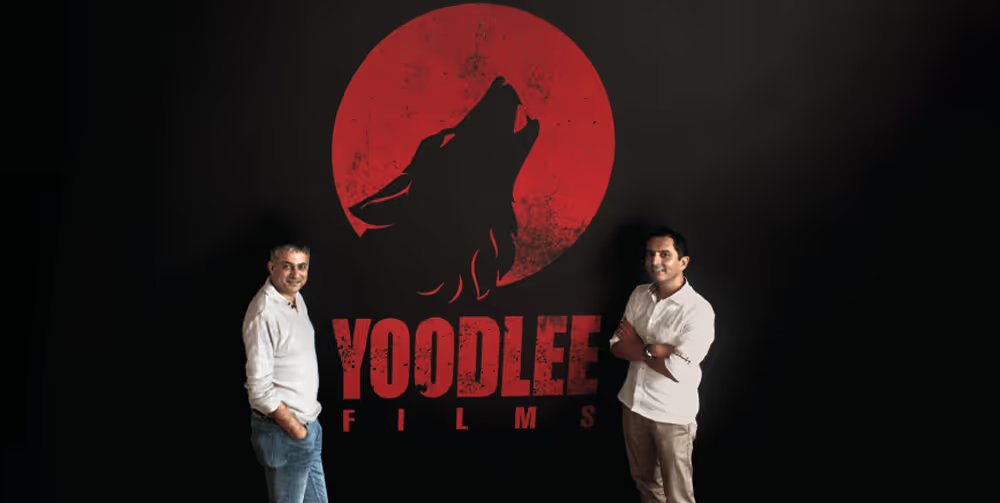
What's next for Yoodlee Films?
The Yoodlee team is now focussing on creating products that are going to be assets for the future. They are planning to create story-led cinema with better star cast meant for theatrical release, in a tightly controlled budget. They are creating movies with a more organic intention - for Saregama to evolve from a music label to a content creation company. And they are not stopping at just video and audio content. Saregama is also excited about creating live business under the Carvaan brand, with expertise from the Yoodlee team.
Conclusion
Yoodlee Films is a terrific template for business execution. Within the complex ambit of film-making – which straddles every aspect of a full business viz strategy, planning, finances, execution, operations, marketing, etc – Yoodlee has put together processes which anticipate trends, create credibility, establish integrity, control impulses and deliver consistent quality.
It is a tribute to their young team that they have been able to be sticklers to discipline as also outliers who are not afraid to experiment – and have still obtained success.
Awards and Accolades
Yoodlee Films have been to 75 film festivals overall! Ajji has the highest number of festival selections at 21, closely followed by Hamid at 19.

Hamid
NATIONAL AWARDS
- Best Urdu Film
- Best Child Actor: Talha Arshad Reshi
UK ASIAN FILM FESTIVAL
- Best Film
- Best Actor: Rasika Dugal
RAJASTHAN INTERNATIONAL FILM FESTIVAL
- Best Director: Aijaz Khan
- Best Actor: Rasika Dugal
FAJR INTERNATIONAL FILM FESTIVAL
- Won the Muhammad Al-Ameen Award, diploma of Honour for best film on Peace
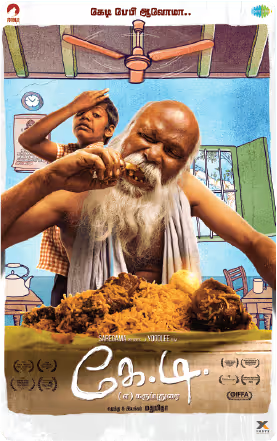
KD
UK ASIAN FILM FESTIVAL
- Best Director: Madhumita
JAGRAN FILM FESTIVAL
- Best Actor: Naga Vishal
VIKATAN AWARD
- Best Child Actor: Naga Vishal
- Best Production
- Best Dialogues: Sabari
SINGAPORE SOUTH ASIAN FILM FESTIVAL
- Best Film Jury Award
INDIAN FILM FESTIVAL OF CINCINNATI
- Best Director: Madhumita
CALEIDOSCOPE INDIAN FILM FESTIVAL OF BOSTON
- Best unconventional role play: Naga Vishal

Ajji
BEAUNE FILM FESTIVAL
- Best Film Award (Fresh Blood Competition)
IFFA
- Special mention to Sushama Deshpande for her acting in Ajji
UK ASIAN FILM FESTIVAL
- Sushama Deshpande won The Flame Award for Ajji
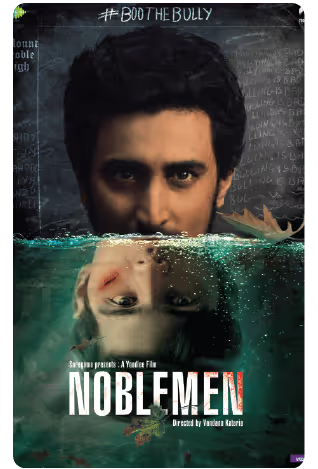
Noblemen
NEW YORK INDIAN FILM FESTIVAL
- Best Child Actor: Ali Haji
